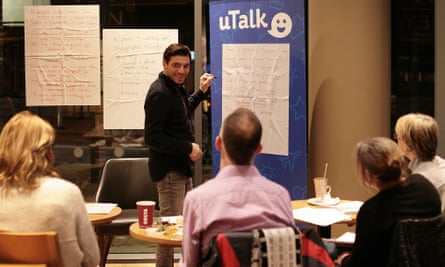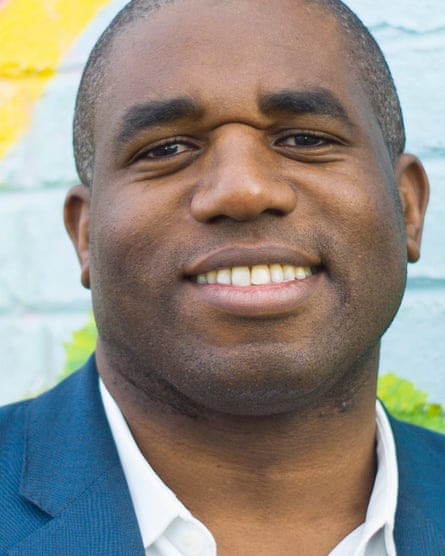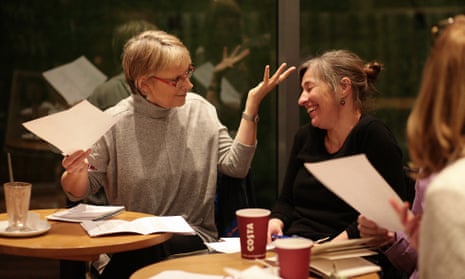It’s a rainy February evening in a Costa coffee shop in East Putney, south-west London. The shop is closed to the public but a group of men and women are gathered there, drinking coffee and practising Italian phrases with teacher Alessandro Fantauzzo. Two are here for work reasons, others to build their language confidence for holidays.
In the past, they might have gone to a night class at a local adult education college. But over the past decade, funding for courses that don’t lead to a formal qualification has been slashed. Since 2010, the adult learning budget has been cut by about 40%, meaning the days when adults could learn flower arranging, languages or guitar at their local college in the evenings – for a subsidised fee or even free – are long gone.
It was this that gave former teacher and social entrepreneur Jason Elsom the idea of offering night classes in coffee shops. Approached by the coffee chain Costa to help develop its charitable foundation, which aims to extend education opportunities, he suggested it offer space in its shops for tutors and their students.
Everyone feels at home in a coffee shop, he says. “You’ll see everyone there. Young mums, business meetings, retired people. And they are often located in places where there aren’t opportunities for adults to learn at all, or where there is only a fairly dismal 1960s secondary school and so people are discouraged from more formal education because of their earlier experience. Plus some people really struggle with going anywhere outside of their daily routine. Not because of a lack of a desire to learn, but because they don’t like things they aren’t used to.”
If the Italian pop-up class in East Putney is anything to go by, he has a point. All the students learned about the class through table-top adverts in the coffee shop, their local haunt, and found the idea less intimidating than attending a college they had never visited before.
One student, Anne Clark, says the lack of exams was important in her decision to attend. “I never liked them,” she scowls, “and I’m not starting at this time in life.”
Heather Naylor, a furniture business owner in her 50s, says she finds colleges “spooky at night, and they smell really weird” whereas the coffee shop has “mint tea, and it’s convivial”. For her, and everyone else in the class – all of whom are over 40 – the familiarity of the place matters, as does its gentle nature. Tonight, two students are missing: one’s father has died, the other has a sick child. It doesn’t matter if a student misses a lesson – they can catch up when they have time. Colleges, on the other hand, must hit an attendance threshold in order to receive payment for courses; if they were studying at a college, students could find themselves under pressure to attend.

Elsom’s first challenge was finding tutors. He turned to private firms and local colleges. In each of the Costas involved, tutors create and run the courses to suit local need. A Costa in a trendy part of north London offers a history of fashion class on a Tuesday. At another, in Milton Keynes, learners can choose courses on starting a business or becoming a landlord. Later this month the Costa in Westfield shopping centre, Stratford, east London, will run an access to health and social care course. By October, 150 Costa shops are likely to host night classes.
Prices of pop-up classes vary, depending on who runs them and what the classes involve, and can range from £120 for six language classes through to access courses (for learners who don’t have A-levels but want to progress to higher education) at about £3,000. Many functional skills classes – basic English and maths, for example – are free.
Using private firms to provide the classes is a further creative, and potentially controversial, twist. The Italian pop-up in East Putney is run by uTalk, a software company that sells a language app. Students get the app free of charge (it normally costs £49). Although uTalk doesn’t make a profit from the classes, they do help build awareness of its brand, and are a chance to get feedback on its language-teaching techniques.
More innovative partnerships are in the pipeline. Elsom says he is in negotiations with a DIY store wanting to host construction courses and restaurants offering their facilities for catering courses before they open for lunch. “If there is no more money for adult learning, then we have to use the assets already out there,” he says.

As someone who benefited from night school, I am enthused by the plan. Back in the late 1990s I took A-levels at night school while working in McDonald’s. Without those A-levels I would not have got into Oxford University. Other students in my classes had different but equally important reasons for being there, including getting extra qualifications so they could gain a new job or pay rise. For one of my fellow students who had had mental health problems, attending night school meant getting out of the house for the first time in years.
The year after I left, the college stopped offering night classes for people who want to get their A-levels in a year. Since then, other institutions that famously opened to educate working adults have become ever more expensive and diminished. In 2012, the coalition government cut the Open University subsidy, sending prices soaring from a few hundred pounds for a course up to several thousand. Free or low-cost online courses, such as those offered by Stanford University in the US, are filling some of the gap, but drop-out rates are high – often about 90%.
More government money will not be forthcoming for adult learning any time soon though. Yet skills will be desperately needed. About half of children still leave school without five GCSE passes including English and Maths. And given most of us are now expected to work into our late 60s, it is inconceivable no further learning will be needed.
The government’s adult-learning loans, introduced in 2013, for anyone aged 19 or older and studying at A-level equivalent or above promised more access to further education. Yet, so far, only £140m of the £400m set aside has been taken and help is not available for people studying lower level qualifications equivalent, say, to a GCSE.
Last month the Labour MP for Tottenham, David Lammy, provoked a debate on night schools in parliament, asking for more opportunities for people over 30 to retrain. He was inspired by his mum, who took shorthand night classes so she could become a secretary, before going on to manage Haringey council.
“The prime minister is on a mission to bring back grammar schools? She should be on a mission to bring back night schools,” Lammy says. “Britain has become a brutal country for people who don’t make their way to university. Many people in the Westminster bubble have no idea how hard it is for ordinary folk in their 30s and 40s, with a mortgage and kids, to get the qualifications to move up and get better paying jobs.”
But he is unenthused by the idea of pop-up courses. “There is a place for innovation, but we are not expecting graduates to go to ‘pop-up universities’. The Westminster elite send their children to Russell Group universities which are well-funded and have government backing. I want to see that same commitment to Britain’s working families.”
Money does matter, and Lammy’s call for a lifelong-learning fund – from which people could draw at any time across their lives up to a set amount – is a good one. But as the low take up of loans shows, it is about more than the money. It is about finding ways for people to feel comfortable and confident with learning, in whichever settings work best for them.
“In the end, it isn’t just about qualifications,” says Lammy, “it is about empowerment. That is the tradition we need to return to.”

Comments (…)
Sign in or create your Guardian account to join the discussion